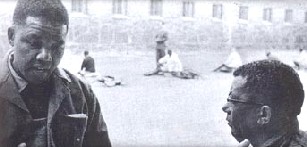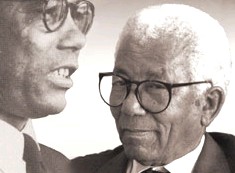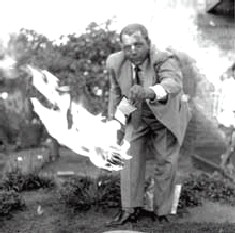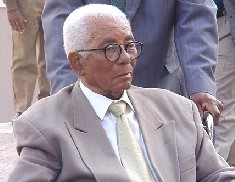Hamba kahle, Walter Sisulu
6 May 2003
Liberation giant Walter Sisulu died peacefully in his Johannesburg home on Monday, 5 May 2003. The death of the 90-year-old former ANC leader marks the end of one of the most illustrious political careers in the history of South Africa's struggle to free itself from apartheid.
Sisulu's life closely reflected the struggle of the African National Congress (ANC) which, like him, celebrated its 90th birthday in 2002.
At his wedding in 1944, the chairman of the ANC Youth League warned his bride, Albertina: "You are marrying a man who is already married to the nation."
The diminutive Sisulu, described by Nelson Mandela as "a man who stands head and shoulders above us all because of his humility and simplicity", was born into a peasant family in the Engcobo area of the Transkei in 1912, and forced by poverty to leave home and school to seek employment in Johannesburg at the age of 15.
Sisulu joined the ANC in 1940, going on to become treasurer of the ANC
Youth League and to press for the adoption of a more radical form of nationalism within the organisation.
It was during these years that Sisulu had his first clash with the authorities - and his first taste of prison - after a scuffle on a train with a white ticket collector who had confiscated an African child's season ticket.
At the ANC's 1949 national conference, Sisulu played a key role in the organisation's acceptance of the Youth League's programme of action, and was elected secretary-general. In 1950 the ANC, together with the Indian Congress and the Communist Party, called for a national strike to protest against the race laws.
Sisulu served on the planning council for the 1950 Defiance Campaign, led a group of passive resisters, and was arrested and briefly imprisoned before being banned under the Suppression of Communism Act.
In December 1952 Sisulu, Mandela and 18 others were tried under the Suppression of Communism Act for their leadership of the Defiance
Campaign, and sentenced to nine months' imprisonment, suspended for two years.
Sisulu was re-elected ANC secretary-general in the same month, and in 1953 spent five months touring China, the Soviet Union, Israel, Rumania and the United
Kingdom.
According to
South African History Online, while Sisulu was impressed with Soviet industrial development, "he was repelled by the authoritarianism of the Stalinist regime", and his trip "was a catalyst in mellowing his views from racially exclusive nationalism to support for a multi-racial Congress alliance".
During the 1960 state of emergency, Sisulu was detained for several months, and following the banning of the ANC and Pan Africanist Congress (PAC), was placed under house arrest. During 1962 Sisulu was arrested six times, but charged only once.
In March 1963, he was convicted for furthering the aims of the ANC, released on bail pending an appeal, and placed under 24-hour
arrest. On 20 April 1963 he went underground to join the ANC's armed wing, Umkhonto We Sizwe.
On 11 July 1963 Liliesleaf Farm, the ANC's secret headquarters, was raided by police. Sisulu, Govan Mbeki and others were detained, and Sisulu was held in solitary confinement for 88 days. He was charged in the Rivonia trial in October 1963, and on 12 June 1964 sentenced to life imprisonment for planning acts of sabotage.
On the following day Sisulu, Mandela and the other convicted Rivonia trialists were sent to Robben Island.
 Mandela and Sisulu, Robben Island prison yard, 1966. (Photo: UWC-Robben Island Mayibuye Archives)
Mandela and Sisulu, Robben Island prison yard, 1966. (Photo: UWC-Robben Island Mayibuye Archives)
On October 1989 the government released Sisulu, six other ANC leaders and a PAC political prisoner. The unbanning of the ANC on 2 February 1990, and the release of Nelson Mandela,
followed a week later.
Sisulu subsequently met with the external wing of the ANC in Lusaka and was asked to lead the ANC internally. This involved re-establishing ANC structures inside the country and preparing for the national conference that was held inside South Africa in December 1990.
Sisulu also formed part of the historic ANC delegation which met with representatives of the government at Groote Schuur, Cape Town in May 1990.
In the foreward to "In Our Lifetime", the recently published biography of Walter and Albertina Sisulu, Nelson Mandela writes: "If we as a liberation movement and a nation were to be given the choice of one life story to be told, that story would have to be Walter Sisuluís. In his life and the work of his life are captured and demonstrated the best, the noblest, the most heroic, the most deeply humane that our movement and our country represent and seek to represent."
In a statement released after Sisulu's death, Mandela said: "Our paths first
intersected in 1941. During the past 62 years our lives have been intertwined ... Together we shared ideas, forged common commitments. We walked side by side through the valley of death ... Together we savoured the taste of freedom.
"In a sense I feel cheated by Walter", Mandela continued. "If there be another life beyond this physical world, I would have loved to be there first so that I could welcome him.
"I now know that when my time comes, Walter will be there to meet me, and I am almost certain he will hold out an enrolment form to register me into the ANC in that world, cajoling me with one of his favourite songs we sang when mobilising people behind the Freedom Charter:
Libhaliwe na iGama lakho
kuloMqulu weNkululeko
Vuma silibhale kuloMqulu
weNkululeko."
(Has your name been enrolled in the struggle for freedom? Permit us to register you in the struggle for freedom.)
"I shall miss his friendship and counsel", Mandela said. "Till we meet again,
Hamba kahle, Xhamela. Qhawe la ma Qhawe!" (Go well, rest in peace, Xhamela. Hero among heroes!)
SouthAfrica.info reporter. Biographical source: South African History Online
 Mandela and Sisulu, Robben Island prison yard, 1966. (Photo: UWC-Robben Island Mayibuye Archives)
On October 1989 the government released Sisulu, six other ANC leaders and a PAC political prisoner. The unbanning of the ANC on 2 February 1990, and the release of Nelson Mandela,
followed a week later.
Sisulu subsequently met with the external wing of the ANC in Lusaka and was asked to lead the ANC internally. This involved re-establishing ANC structures inside the country and preparing for the national conference that was held inside South Africa in December 1990.
Sisulu also formed part of the historic ANC delegation which met with representatives of the government at Groote Schuur, Cape Town in May 1990.
In the foreward to "In Our Lifetime", the recently published biography of Walter and Albertina Sisulu, Nelson Mandela writes: "If we as a liberation movement and a nation were to be given the choice of one life story to be told, that story would have to be Walter Sisuluís. In his life and the work of his life are captured and demonstrated the best, the noblest, the most heroic, the most deeply humane that our movement and our country represent and seek to represent."
In a statement released after Sisulu's death, Mandela said: "Our paths first
intersected in 1941. During the past 62 years our lives have been intertwined ... Together we shared ideas, forged common commitments. We walked side by side through the valley of death ... Together we savoured the taste of freedom.
"In a sense I feel cheated by Walter", Mandela continued. "If there be another life beyond this physical world, I would have loved to be there first so that I could welcome him.
"I now know that when my time comes, Walter will be there to meet me, and I am almost certain he will hold out an enrolment form to register me into the ANC in that world, cajoling me with one of his favourite songs we sang when mobilising people behind the Freedom Charter:
Mandela and Sisulu, Robben Island prison yard, 1966. (Photo: UWC-Robben Island Mayibuye Archives)
On October 1989 the government released Sisulu, six other ANC leaders and a PAC political prisoner. The unbanning of the ANC on 2 February 1990, and the release of Nelson Mandela,
followed a week later.
Sisulu subsequently met with the external wing of the ANC in Lusaka and was asked to lead the ANC internally. This involved re-establishing ANC structures inside the country and preparing for the national conference that was held inside South Africa in December 1990.
Sisulu also formed part of the historic ANC delegation which met with representatives of the government at Groote Schuur, Cape Town in May 1990.
In the foreward to "In Our Lifetime", the recently published biography of Walter and Albertina Sisulu, Nelson Mandela writes: "If we as a liberation movement and a nation were to be given the choice of one life story to be told, that story would have to be Walter Sisuluís. In his life and the work of his life are captured and demonstrated the best, the noblest, the most heroic, the most deeply humane that our movement and our country represent and seek to represent."
In a statement released after Sisulu's death, Mandela said: "Our paths first
intersected in 1941. During the past 62 years our lives have been intertwined ... Together we shared ideas, forged common commitments. We walked side by side through the valley of death ... Together we savoured the taste of freedom.
"In a sense I feel cheated by Walter", Mandela continued. "If there be another life beyond this physical world, I would have loved to be there first so that I could welcome him.
"I now know that when my time comes, Walter will be there to meet me, and I am almost certain he will hold out an enrolment form to register me into the ANC in that world, cajoling me with one of his favourite songs we sang when mobilising people behind the Freedom Charter:
 Walter Ulyate Max Sisulu, 1912-2003 (Photos: SA History Online)
Walter Ulyate Max Sisulu, 1912-2003 (Photos: SA History Online)
 Sisulu burns his pass, 1960 (Photo: SA History Archive)
Sisulu burns his pass, 1960 (Photo: SA History Archive)
 Sisulu on his 90th birthday, 17 May 2002 (Photo: Lucille Davie)
Sisulu on his 90th birthday, 17 May 2002 (Photo: Lucille Davie)



